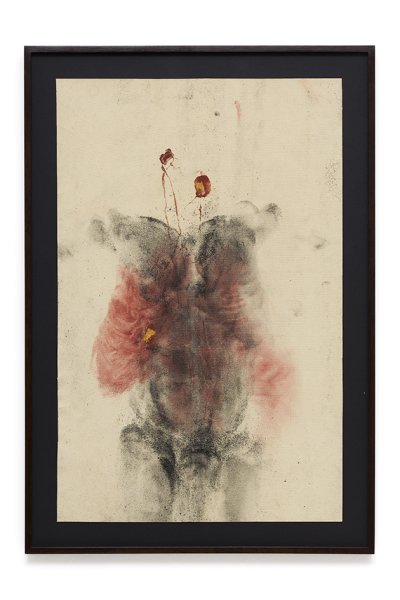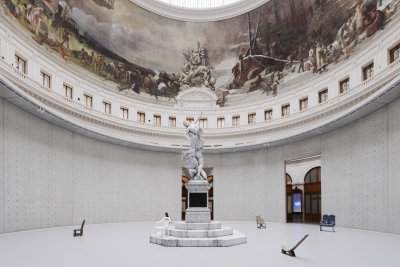Fecha-Corpo
Monotype on canvas, golden nankin, pigment and charcoal powder
106 × 68 cm (41 3/4 × 26 3/4 in.)
This monotype showing the artist's body pressed directly onto the canvas, printing its own materiality on the surface of the painting, makes manifest Antonio Oba's interest in the place of the body and, more particularly, points to the question of the representation of the black body. Drawing on the history of modern and contemporary art, it also recalls the Body Prints by the African-American artist David Hammons, also reactivating—by desacralizing—Yves Klein's anthropometric process.
In his drawings and paintings, as well as in his performances, Antonio Oba uses his own mixed-race body to question the place of the black man in Brazilian society. This artistic and political commitment led to his being censored in the Queermuseum exhibition in Porto Alegre, Brazil, and being forced into exile in the face of death threats.
Antonio Oba's work stems from his research on the relations of influence and exchange in the construction of Brazilian culture: the erasure of the African component of the history of Brazilian art leaves room for an act of resistance and reflection on the idea of a national identity, in a country that suffers particularly from ethnic prejudices, around the questions of race, origins, and skin colour.
Born in 1983 in the suburbs of Brasilia, Antonio Oba is immersed in the Brazilian religious world, particularly through Candomblé culture and the worship of Orisha deities, a mixture of Catholicism, indigenous rites, and African beliefs. In his work, he reconfigures aspects of a rural tradition, imbued with mysticism, caught in the roots of secular traditions, and thus reflects critically on the idea of a supposed Brazilian syncretism. His works also draw on his personal, family, and emotional memory.
Fecha-Corpo is presented for the first time by the Pinault Collection in the exhibition "Ouverture" at the Bourse de Commerce in 2021.





